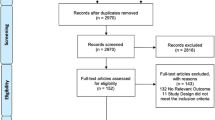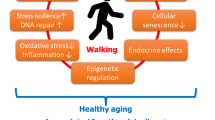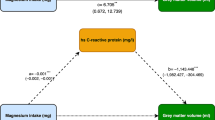Abstract
Background
There is equivocal evidence about beneficial properties of omega-3 long-chain polyunsaturated fatty acids (ω-3 LCPUFA) for older adults.
Objective
This study investigated the relationship between circulating ω-3 LCPUFA, docosahexaenoic acid (DHA) and eicosapentaenoic acid (EPA) levels and their corresponding dietary intakes with cognition and physical function in a cohort of community-dwelling older adults at risk of dementia.
Methods
A cross-sectional analysis was conducted among 142 community-dwelling older adults (60–85 years) with subjective memory complaints. Erythrocyte fatty acids (ω-3 LCPUFA) and the omega-3 index were measured; dietary DHA and EPA were assessed with a LCPUFA specific questionnaire. Cognition was measured using the Cogstate computerised battery and Trail-making tests. Muscle strength was assessed by grip strength and physical function via the four-square step test, 30-second sit-to-stand, timed up-and-go test, and 4-m walk test. Multiple regression analysis was used to assess the relationship between erythrocyte ω-3 LCPUFA, dietary intake, cognitive and physical function.
Results
Higher dietary DHA and EPA were associated with better global cognitive function (DHA: β=0.164, p=0.042; EPA: β=0.188, p=0.020). Higher dietary EPA was associated with better attention/psychomotor composite scores (β=0.196, p=0.024), mobility (four-square step test: β=−0.202, p=0.015) and gait speed (4m walk test: β=−0.200, p=0.017). No associations were found between erythrocyte ω-3 LCPUFA and cognitive or functional performance measures.
Conclusions
In community-dwelling older adults with subjective memory complaints, higher dietary ω-3 LCPUFA intake was associated with better cognitive and physical function, supporting the evidence that ω-3 fatty acids play a role in optimising physical and cognitive health during ageing.
Similar content being viewed by others
Abbreviations
- AD:
-
Alzheimer’s disease
- APOE-ε4:
-
apolipoprotein E-ε4 allele
- ASA-24:
-
Automated Self-Administered 24-hour
- DHA:
-
docosahexaenoic acid
- EPA:
-
eicosapentaenoic acid
- FSST:
-
four-square step test
- MCI:
-
mild cognitive impairment
- MoCA:
-
Montreal Cognitive Assessment
- SDT:
-
Suggested Dietary Targets
- STS:
-
sit-to-stand test
- TUG:
-
3 metre timed up and go
- ω-3 LCPUFA:
-
omega-3 long-chain polyunsaturated fatty acids
References
Beard JR, Officer A, De Carvalho IA, Sadana R, Pot AM, Michel J-P, et al. The world report on ageing and health: a policy framework for healthy ageing. Lancet. 2016;387:2145–54.
Cole GM, Ma Q, Frautschy SA. Dietary fatty acids and the aging brain. Nutr Rev. 2010;68:S102–11.
Clegg A, Young J, Iliffe S, Rikkert MO, Rockwood K. Frailty in elderly people. Lancet. 2013;381(9868):752–62.
Franceschi C, Campisi J. Chronic inflammation (inflammaging) and its potential contribution to age-associated diseases. J Gerontol A Biol Sci Med Sci. 2014;69(Suppl 1):S4–S9.
Freitas HR, de Melo Reis RA, Ferreira GdC, Trevenzoli IH, de Jesus Oliveira K. Fatty acids, antioxidants and physical activity in brain aging. Nutrients. 2017;9(11): 1263.
Mi W, van Wijk N, Cansev M, Sijben JW, Kamphuis PJ. Nutritional approaches in the risk reduction and management of Alzheimer’s disease. Nutrition. 2013;29(9): 1080–9.
Huang Y. Roles of apolipoprotein E4 (ApoE4) in the pathogenesis of Alzheimer’s disease: lessons from ApoE mouse models. Biochem Soc Trans. 2011;39(4):924–32.
Van de Rest O, Geleijnse JM, Kok FJ, van Staveren W, Dullemeijer C, Olde Rikkert M, et al. Effect of fish oil on cognitive performance in older subjects. Neurology. 2008;71:430–8.
Lukaschek K, Von Schacky C, Kruse J, Ladwig K. Cognitive impairment is associated with a low omega-3 index in the elderly: results from the KORA-age study. Dement Geriatr Cogn Disord. 2016;42(3–4):236–45.
Barberger-Gateau P, Jutand MA, Letenneur L, Larrieu S, Tavernier B, Berr C, et al. Correlates of regular fish consumption in French elderly community dwellers: data from the Three-City study. Eur J Clin Nutr. 2005;59(7):817–25.
Milte CM, Sinn N, Street SJ, Buckley JD, Coates AM, Howe PR. Erythrocyte polyunsaturated fatty acid status, memory, cognition and mood in older adults with mild cognitive impairment and healthy controls. Prostag Leukot Ess. 2011;84(5–6): 153–61.
Lee LK, Shahar S, Chin AV, Yusoff NA. Docosahexaenoic acid-concentrated fish oil supplementation in subjects with mild cognitive impairment (MCI): a 12-month randomised, double-blind, placebo-controlled trial. Psychopharmacology (Berl). 2013;225(3):605–12.
Sinn N, Milte CM, Street SJ, Buckley JD, Coates AM, Petkov J, et al. Effects of n-3 fatty acids, EPA v. DHA, on depressive symptoms, quality of life, memory and executive function in older adults with mild cognitive impairment: a 6-month randomised controlled trial. Br J Nutr. 2012;107(ll):1682–93.
Smith GI, Julliand S, Reeds DN, Klein S, Mittendorfer B, Sinacore DR. Fish oil-derived n-3 PUFA therapy increases muscle mass and function in healthy older adults. Am J Clin Nutr. 2015; 102(1): 115–22.
Abbatecola A, Cherubini A, Guralnik J, Lacueva C, Ruggiero C, Maggio M, et al. Plasma polyunsaturated fatty acids and age-related physical performance decline. Rejuv Res. 2009;12(1):25–32.
Hutchins-Wiese H, Kleppinger A, Annis K, Liva E, Lammi-Keefe C, Durham H, et al. The impact of supplemental n-3 long-chain polyunsaturated fatty acids and dietary antioxidants on physical performance in postmenopausal women. J Nutr Health Aging. 2013;17(1):76–81.
Frison E, Boirie Y, Peuchant E, Tabue-Teguo M, Barberger-Gateau P, Feart C. Plasma fatty acid biomarkers are associated with gait speed in community-dwelling older adults: the Three-City-Bordeaux study. Clin Nutr. 2017;36(2):416–22.
Reinders I, Song X, Visser M, Eiriksdottir G, Gudnason V, Sigurdsson S, et al. Plasma phospholipid PUFAs are associated with greater muscle and knee extension strength but not with changes in muscle parameters in older adults. J Nutr. 2015; 145(1): 105–12.
Cornish SM, Myrie SB, Bugera EM, Chase JE, Turczyn D, Pinder M. Omega-3 supplementation with resistance training does not improve body composition or lower biomarkers of inflammation more so than resistance training alone in older men. Nutr Res. 2018;60:87–95.
Krzyminska-Siemaszko R, Czepulis N, Lewandowicz M, Zasadzka E, Suwalska A, Witowski J, et al. The effect of a 12-week omega-3 supplementation on body composition, muscle strength and physical performance in elderly individuals with decreased muscle mass. Int J Environ Res Public Health. 2015; 12(9): 10558–74.
Mendonca MD, Alves L, Bugalho P. From Subjective Cognitive Complaints to Dementia: Who is at Risk?: A Systematic Review. Am J Alzheimers Dis Other Demen. 2016;31(2):105–14.
Luck T, Luppa M, Matschinger H, Jessen F, Angermeyer MC, Riedel-Heller SG. Incident subjective memory complaints and the risk of subsequent dementia. Acta Psychiatr Scand. 2015;131(4):290–6.
Wesselman LMP, Doorduijn AS, de Leeuw FA, Verfaillie SCJ, van Leeuwenstijn-Koopman M, Slot RER, et al. Dietary Patterns Are Related to Clinical Characteristics in Memory Clinic Patients with Subjective Cognitive Decline: The SCIENCe Project. Nutrients. 2019; 11(5).
Macpherson H, Brownell S, Duckham RL, Meyer B, Mirzaee S, Daly RM. Multifaceted intervention to enhance cognition in older people at risk of cognitive decline: study protocol for the Protein Omega-3 and Vitamin D Exercise Research (PONDER) study. BMJ Open. 2019;9(5):e024145.
Wong A, Law LS, Liu W, Wang Z, Lo ES, Lau A, et al. Montreal cognitive assessment: One cutoff never fits all. Stroke. 2015;46(12):3547–50.
World Health Organization. Body mass index — BMI 2019 [Available from: http://www.euro.who.int/en/health-topics/disease-prevention/nutrition/a-healthy-lifestyle/body-mass-index-bmi.
Lepage G, Roy C. Improved recovery of fatty acid through direct transesterification without prior extraction or purification. J Lip Res. 1984;25:1391–5.
Kish-Trier E, Schwarz EL, Pasquali M, Yuzyuk T. Quantitation of total fatty acids in plasma and serum by GC-NCI-MS. Clin Mass Spectrom. 2016;2:11–7.
Swierk M, Williams P, Wilcox J, Russell K, Meyer B. Validation of an Australian electronic food frequency questionnaire to measure polyunsaturated fatty acid intake. Nutrition. 2011;27(6):641–6.
National Cancer Institute. ASA24-Australia 2018, October 3 [Available from: https://epi.grants.cancer.gov/asa24/respondent/australia.html.
Cogstate. Computerised cognitive assessment batteries 2019 [Available from: https://www.cogstate.com/clinical-trials/computerized-cognitive-assessment/featured-batteries/.
Hammers D, Spurgeon E, Ryan K, Persad C, Heidebrink J, Barbas N, et al. Reliability of repeated cognitive assessment of dementia using a brief computerized battery. Am J Alzheimers Dis. 2011;26(4):326–33.
Bowie CR, Harvey PD. Administration and interpretation of the trail making test. Nat Protoc. 2006; 1(5):2277–81.
Massy-Westropp N, Gill T, Taylor A, Bohannon R, Hill C. Hand Grip Strength: age and gender stratified normative data in a population-based study. BMC Res Notes. 2011;4.
Maggio M, Ceda GP, Ticinesi A, De Vita F, Gelmini G, Costantino C, et al. Instrumental and non-instrumental evaluation of 4-meter walking speed in older individuals. PLoS One. 2016;11(4):e0153583.
Dite W, Temple VA. A clinical test of stepping and change of direction to identify multiple falling older adults. Arch Phys Med Rehabil. 2002;83(11): 1566–71.
Podsiadlo D, Richardson S. The timed “Up & Go”: a test of basic functional mobility for frail elderly persons. J Am Geriatr Soc 1991;39:142–8.
Jones C, Rikli R, Beam W. A 30-s chair stand test as a measure of lower body strength in community-residing older adults. Res Quart Exer Sport. 1999;70(2): 113–9.
Nasreddine Z, Phillips N, Bedirian V, Charbonneau S, Whitehead V, Collin I, et al. The Montreal cognitive assessment, MoCA: a brief screening tool for mild cognitive impairment. JAGS. 2005;53(4):695–9.
Australian National Health and Medical Research Council Nutrient Reference Values for Australia and New Zealand. Fats: total fat & fatty acids. [Available from: https://www.nrv.gov.au/nutrients/fats-total-fat-fatty-acids.
Gonzalez S, Huerta JM, Fernandez S, Patterson AM, Lasheras C. The relationship between dietary lipids and cognitive performance in an elderly population. Int J Food Sci Nutr. 2010;61(2):217–25.
Roberts R, Cerhan J, Geda Y, Knopman D, Cha R, Christianson T, et al. Polyunsaturated fatty acids and reduced odds of MCI: the Mayo clinic study of aging. J Alzheimers Dis. 2010;21(3):853–65.
Phillips C. Lifestyle modulators of neuroplasticity: how physical activity, mental engagement, and diet promote cognitive health during aging. Neural Plast. 2017;2017:1–22.
Howe P, Meyer B, Record S, Baghurst K. Dietary intake of long-chain omega-3 polyunsaturated fatty acids: contribution of meat sources. Nutrition. 2006;22(1):47–53.
Chiu C-C, Su K-P, Cheng T-C, Liu H-C, Chang C-J, Dewey ME, et al. The effects of omega-3 fatty acids monotherapy in Alzheimer’s disease and mild cognitive impairment: a preliminary randomized double-blind placebo-controlled study. Prog Neuropsychopharmacol Biol Psychiatry. 2008;32(6): 1538–44.
Ter Borg S, Luiking YC, van Helvoort A, Boirie Y, Schols J, de Groot C. Low levels of branched chain amino acids, eicosapentaenoic acid and micronutrients are associated with low muscle mass, strength and function in community-dwelling older adults. J Nutr Health Aging. 2019;23(1):27–34.
Robinson SM, Jameson KA, Batelaan SF, Martin HJ, Syddall HE, Dennison EM, et al. Diet and its relationship with grip strength in community-dwelling older men and women: the Hertfordshire cohort study. J Am Geriatr Soc. 2008;56(1):84–90.
Reinders I, Murphy RA, Song X, Visser M, Cotch MF, Lang TF, et al. Polyunsaturated fatty acids in relation to incident mobility disability and decline in gait speed: the age, gene/environment susceptibility Reykjavik study. Eur J Clin Nutr. 2015;69(4):489–93.
Fougere B, Goisser S, Cantet C, Soriano G, Guyonnet S, De Souto Barreto P, et al. Omega-3 fatty acid levels in red blood cell membranes and physical decline over 3 years: longitudinal data from the MAPT study. Geroscience. 2017;39(4):429–37.
Virtanen JK, Mozaffarian D, Cauley JA, Mukamal KJ, Robbins J, Siscovick DS. Fish consumption, bone mineral density, and risk of hip fracture among older adults: the cardiovascular health study. JBMR. 2010;25(9): 1972–9.
Wade A, Tregoweth E, Greaves D, Olds T, Buckley J, Keage H, et al. Long-chain omega-3 fatty acid intake is associated with age but not cognitive performance in an older australian sample. J Nutr Health Aging. 2020.
Dumic I, Nordin T, Jecmenica M, L S, Milosavljevic T, Milovanovic T. Gastrointestinal tract disorders in older age. Can J Gastroent Hepatol. 2019;2019:1–19.
Nishihira J, Tokashiki T, Higashiuesato Y, Willcox DC, Mattek N, Shinto L, et al. Associations between serum omega-3 fatty acid levels and cognitive functions among community-dwelling octogenarians in Okinawa, Japan: the Kocoa study. J Alzheimers Dis. 2016;51(3):857–66.
Meyer BJ, Swierk M, Russell KG. Assessing long-chain omega-3 polyunsaturated fatty acids: a tailored food-frequency questionnaire is better. Nutrition. 2013;29(3):491–6.
Cunnane SC, Plourde M, Pifferi F, Begin M, Feart C, Barberger-Gateau P. Fish, docosahexaenoic acid and Alzheimer’s disease. Prog Lipid Res. 2009;48(5):239–56.
Author information
Authors and Affiliations
Contributions
Authors’ contributions to manuscript: HM and BRC: designed research and had primary responsibility for final content; RE conducted research and wrote the paper; BJM conducted omega-3 analyses; HM, SB and RLD conceptualised the Randomised Control Trial; SB and SOC collected and curated data; SM was the medical overseer of the trial. All authors have read and approved the final manuscript.
Corresponding author
Ethics declarations
Ethical standards: This study complies with the laws of Australia.
Disclosure of Interest Statement: SB reports grants from National Health and Medical Research Council and personal fees from Deakin University during the conduct of the study. HM reports grants from NHMRC and ARC, and non-financial support from Omniblend outside the submitted work. SM reports personal fees from Amgen and Sanofi outside the submitted work. BRC, BJM, RE, RD, RMD and SOC have no conflict of interest to disclose.
Rights and permissions
About this article
Cite this article
Erhardt, R., Cardoso, B.R., Meyer, B.J. et al. Omega-3 Long-Chain Polyunsaturated Fatty Acids: Are They Beneficial for Physical and Cognitive Functioning in Older Adults?. J Nutr Health Aging 25, 454–461 (2021). https://doi.org/10.1007/s12603-020-1553-7
Received:
Accepted:
Published:
Issue Date:
DOI: https://doi.org/10.1007/s12603-020-1553-7




